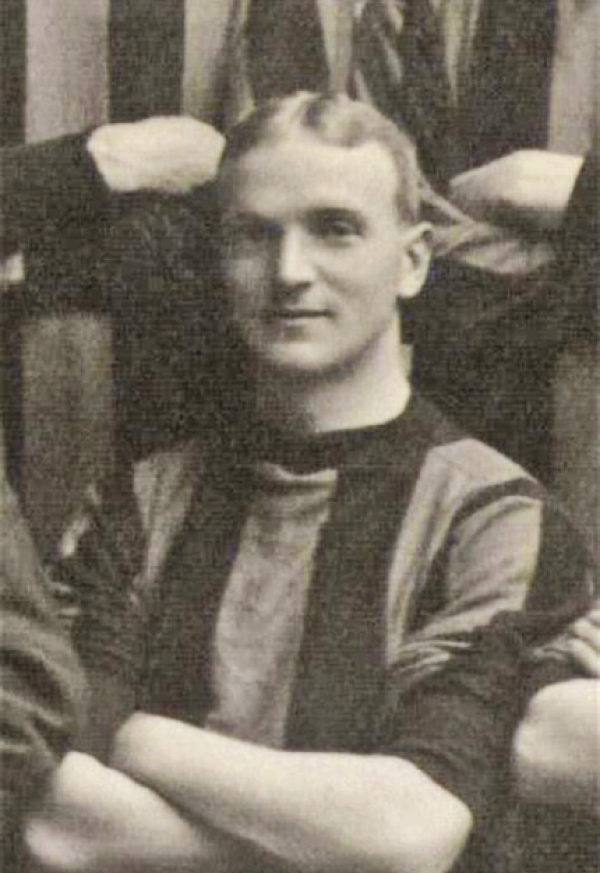
By Gavan Bergin
Charlie O’ Hagan played his second international game for Ireland against Wales in Belfast on April 4th 1905. In that match Ireland started poorly, with Wales dominating the early stages.
Though Ireland won the ball back quickly and made some incursions on the away team’s defence, the flow of the match was soon reversed as Ireland were forced back in their own half and put under great pressure.
They just managed to hold out early on, even launching some forward rushes before Wales again took the initiative and threatened the home goal.
The game settled into a to and fro pattern, both teams alternating between attack and defence, but neither able to break through. Charlie worked hard from the start to make an impact, and early on, he came close to making the difference for his team when he freed himself of his marker, ran clear and made a beautifully incisive pass to his partner in attack, Murphy, who hit a shot from which Ireland very nearly scored.
Soon afterwards, a mistake by the Irish defence let in Wales who were more clinical with their opportunity, putting it away to open the scoring.
Ireland did not crumble, though, and they rallied forward again. Charlie kept going hard, he tore forward again, forcing a corner to give Ireland an opportunity to put pressure on the Welsh goalkeeper. But it was a chance wasted and Ireland were made to pay for it when Wales, defending the corner, won the ball back and sprung a rapid counter move from their own area, the length of the pitch and into the Irish box, where they were clinical in finishing the attack off, scoring their second goal 2-0. At that point it looked like it was all over for Ireland.
But that second goal, instead of sinking the Irish players, seemed to spark them into life. They went back on the attack, with Charlie playing his heart out and having his best spell in the game. He seemed to be bursting with energy, and with his help the Irish forward line put Wales under sustained pressure for the first time.
Dashing up the right wing again and again, over and over Charlie attempted to break through the Welsh back line. Although time after time they blocked him out, he kept going back for another run at them.
He was relentless, and his persistence eventually paid off, as he managed to find a chink in the Welsh armour then force his way through and clear to play a perfectly-placed pass through to the striker, Murphy, who scored for Ireland, making it 1-2.
With that, Ireland looked hard and fast on the comeback trail, but with time in the first half slipping away it seemed as if the Welsh would manage to hold their lead at the break, giving them a chance to regroup for the second half. But, as the clock ticked on, with mere seconds remaining, Charlie launched himself on one more attack-and this time he wasn’t looking to play anyone in, he wasn’t looking to pass the ball, he just went straight up the field and, shrugging off every attempt at stopping him, he flew like tracer fire into the Welsh penalty area, then smashed a bullet of a shot into the lower right corner.
It was his first international goal, and it was the equaliser for Ireland! Immediately afterwards, the referee blew the whistle and at the end of the first-half the score was 2-2.
From the start of the second half, the Irish players were calm and considered in their play and they kept control of the ball, preventing Wales from getting back into the game. Charlie was spirited and smart in his contributions, helping to prevent any slip-up that might cost the team a rare good result. Back then, that simply meant managing to avoid defeat.
And the final score remained 2-2. The Evening Herald reporting on the game and the satisfactory result praised “good play by O’Hagan, who had nicely placed the ball to Murphy for Ireland’s first goal, then equalized in decisive style for their second. Playing in only his second international match, the Tottenham Hotspur forward was intelligent in movement and active in possession throughout the ninety minutes. He must surely be a likely selection in the Irish team, for some time to come ”
That prediction was an accurate one, and Charlie became a regular in the Irish attack, missing only two games in the next five years, and throughout that time he kept playing the same way, making plenty of goals for his team and running the opposition ragged every chance he got. He played his last international match in 1909 after winning eleven caps, scoring two goals and giving much joy to Ireland’s supporters.
When Charlie retired from playing after the 1912/13 season, there were limited options open to a retired footballer. Apart from the newspapers, there was no sport media so there were no lucrative pundit jobs. But Charlie was fortunate. He had the option to go back to Ireland and work in the family business. However, at the age of 31 he was still a young man, he wasn’t ready to settle down. There were a few more adventures on his horizon.
For three years he vanished from the public eye, until March 1915, when an article in the Evening Telegraph newspaper reported that Charlie had “just secured a commission as a second lieutenant of the Leinster Regiment, having left his old regiment, the Irish Guards and recovered from a somewhat serious illness – and he is now fit and ready for military duty”
He did that duty with the Highland Light Infantry, fighting in France and Belgium until the end of the War in 1918.
It might be expected that, after the horror of the Western Front, Charlie might have been ready for some peace and quiet. For two years after the War there was no word of him at all in the newspapers. He reappeared, back on the football scene as the manager of the English Division Three club, Norwich City, for the 1920/21 season.
The job was by no means a resounding success for Charlie: Norwich did not do well and he resigned after that one season. But the experience taught him much about the job of management, as he showed in 1923, when he took the job of managing the oldest football club in Spain, Sevilla FC.
He was the club’s first-ever foreign manager, and he did a fine job there. Charlie managed Sevilla to a spectacular season, in which they won every match they played during the 1923/24 season of the Andalusian Championship. As well as winning the league, Sevilla also reached the quarter-final of the Copa Del Rey.
As great a season as it was for Charlie, it wasn’t enough to make him hang around for another season in Spain, and in June 1924 he moved back to Ireland with his wife and daughter. He didn’t stay put for long though, his rambling fever took hold again, and off he went to Germany, where he became the manager of the Berlin side, BFC Preussen.
The job didn’t last, though. Charlie had his contract cancelled after two weeks, and he got nothing more from his time in Berlin than than a one-way ticket to London. According to an interview he did at the time, everything had been going well at Preussen until the people who ran the club found out that he had fought against Germany in the War. Whether or not that was the reason, they got rid of Charlie right quick.
He didn’t go back into management after that, and while he didn’t have a glorious end to his career in football, what went before was remarkable enough to make up for it.
Charlie returned from Germany to London and made his way back home to Derry in late 1924. For four years he lived the quiet life with his family, but there was one more big adventure ahead. In 1928, Charlie sailed to New York and stayed there for the rest of his life.
Charlie O’Hagan. The Entertainer.



